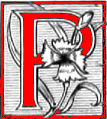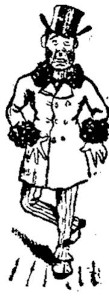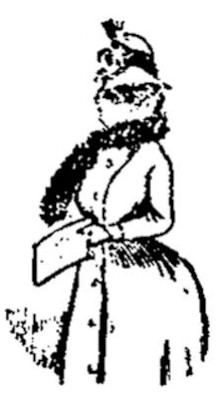This article has been transcribed from a copy of the Cardiff Times in the online collection of scanned Welsh newspapers 1804-1919 in the National Library of Wales, with grateful recognition of the free access accorded to all readers. Here we see Samuel’s comic method very clearly. The text is not edited to remove offensive language and attitudes that were widespread at the time. Paragraph breaks have been introduced for easier reading. — David Skilton

Samuel, made up

erhaps, sir, you never knew that I had been an actor — I mean a professional actor, of course, and not one in private life. The position I occupied in the profession was not a lofty one; in fact, lest my finely expressive features should impress the multitude too strongly, professional jealousy compelled me during each pantomime season to the wearing of a huge mask of sorrowful, not to say horrific aspect, and I had to do bill-sticking in the day-time. When I happened not to be shrouded in the hideous covering I have spoken of, I was converted into the back-leg of an elephant, or I had to play the part of the surging billows, and to crawl about beneath a turbulent canvas ocean. In the legitimate drama I was somewhat more favoured, and on more than one occasion attained to the dignity of playing the part of the second Murderer, First Desperado, and so on. The worst of playing such parts was that I had no specific name in the bill, and this somewhat detracted from anything in the way of public credit, I might otherwise have obtained. On one occasion, sir, I actually did, however, receive a favourable notice in a most important and influential newspaper — an organ which has, as I was informed at the time, a circulation of quite eighty copies a week. This was the Slushford Signpost, and the notice therein, which was written by a youth who must have possessed marvellous acumen for his years, said, ‘Mr Claude de Casabianca’ (that is the name by which I was known, sir), ‘as the Policeman in the Harlequinade, submitted to the knocking about he received at the hands of the Clown with an easy grace which marks him out for future greatness.’ What do you think of that, sir? Out of my next week's salary (eighteen shillings a week — when I got it), I purchased a scrap book and pasted that notice in it, but at present the said notice occupies quite a solitary position — it has no companion to keep it in countenance. But I will not at present dwell, sir, on my own dramatic experience, though some day I shall, no doubt, give you the history of my connection with the stage in extenso.

A Break down and a Kick up
The purpose of this present article is to tell you something of what is to be seen during a pantomime rehearsal. I know a lot of people who would like to go to a pantomime rehearsal — and who would soon be heartily sick of it if they did. Let your readers suppose, sir, that we have the necessary pass word to extort civility from that Cerberus-like and obdurate personage, the ‘stage-door-keeper’ of the particular theatre we are visiting, and that we are ascending a gloomy and ill-lighted staircase, which you would I rather expect would lead to a condemned cell than to the stage, which in the glory of gaslight looks so eminently attractive — from the front of the house. We emerge finally into a dimly-lighted corridor, and in another moment are upon the stage. Now, there are various kinds of rehearsals. There are ballet rehearsals — but this is a family newspaper, and I daren't take you to one of these, even were I permitted to go myself, for, sir, do you know that your Samuel bears the reputation of being a killing old dog. There are music rehearsals, where the conductor, with more than Job-like patience, goes through the same tune over and over and over again, trying to instil even the air into chorus young ladies who have, as a rule, far more padding in their fingers [figures?] than music in their souls. And, oh, how dismal at these music rehearsals does the supposedly excruciating song of the low comedian sound; it is a veritable dirge, the accompaniment to which might fitly be the rattling: of sepulchral bones and the clanking of prison gyves. Little would you appreciate the top note of Madame Caterwauli, the principal singing lady, were you to hear how many times she storms it or has to hark back — or squall back. Then there are band rehearsals, whereat the conductor assiduously beats time, and looks as though he'd like to beat the members of the orchestra too. But it is the proper stage rehearsal, the rehearsal of the parts that I would speak of.

Samuel is Winged – Side Winged: and is here Seen Shifted.
The advent of your Samuel up on the stage, sir, creates no manner of surprise. Possibly, as the members of the company have not yet become fully acquainted with each other's personality, your Samuel is taken to be one of the corps dramatique (I always like to put in a bit ‘o‘ furrin’ when I can, sir; I suppose you don't object). The stage is in semi-gloom, an arrangement in the shape of the letter T, down by the footlights, giving forth all the illumination considered necessary. As we emerge upon the stage, we almost stumble upon a gentleman who seems to have developed maniacal, spring-heeled Jack sort of symptoms, and who prances about quite undeterred by the advent of your Samuel, like a delirious acrobat. I am subsequently informed that he is known on the boards as the ‘man that can't keep still,’ and that he is practising his celebrated dance. The auditorium is a dismal wilderness, the white cloths suspended all down the sides of the tiers of boxes seeming to suggest that the latter have been draped in their cerecloths, and are about to be decently interred. Near the T light stands a table, beside which sits the author of the ‘book,’ a much-to-be- pitied gentleman whom melancholy has marked for its own, no doubt through the said author's indulgence in a long series of attempts to distort the English language into pitiful puns. The gentleman's ‘book,’ I may mention, has literally been turned inside out, and then shaken up in the stage managerial bag and well mixed. Scene 2 has been converted into Scene 9; all the jokes out of Scene 4 have been totally eliminated in favour of a performance by a camel which dances a hornpipe, and the principal speech of the ‘singing fairy,’ upon which the author particularly prided himself, has been wholly cut out. Near the author sits, for a moment or two, the stage-manager, with fixed determination on his face; nay, I might almost say that the said individual's visage betokens in the mind of the possessor thereof a rooted antipathy to all mankind — and particularly pantomime companies.

Painful Corn Sequence.
Groups of clean-shaken men and much-bemuffled females stand all round, whilst the hum of somewhat suppressed conversation is to be heard. ‘Not a bit of “fat” in my part,’ says the elegant young female who is to appear as the ‘principal girl.’ ‘Why can't I do my song and dance in the fairy scene where the “spectarcle” (I give the word as she pronounces it, sir) is?’ asks the principal boy, who looks, in her wraps, for all the world like ‘Aunt Sally’ at the fair, leaving out what you can see of her face, of course. ‘Oi' ain’t got a line to speak,’ says a gentleman in a big ulster, a shiny hat very much on one side, and an elaborate diamond — presumably paste-diamond — brooch stuck in a gaudy necktie; ‘manidgers seems to think as how agerabats haint hable ta speak the Queen's Henglish!’ And the two principal low comedy gentlemen survey each other in a shifty and dissimulating sort of way and one of them whispers to a supposed friend, ‘Wish I'd had the “woman's” part that's been given to Mugger; my part of the Baron is right out of it.’ ‘Wish I'd had a chance as the Baron,’ whispers Mugger to his chosen ‘pal,’ ‘Pantomime old women, with bottles, are played out.’ ‘It's a downright shame,’ says another gentleman, a personage with a very jaunty air and a waxed moustache ‘my little lydy hasn't got nothink to say; I know’ (this with a most portentous wink), ‘which of the lydy's has got the coaly part [part with ‘good’ lines] from the blooming author.’ Just at this moment, sir, I receive a hideous bump in the small of the back, and a rough voice shouts ‘Ger out of the way, can't yer.’ A huge piece of scenery is being moved just near me by several men who look like carpenters. I spring on one side, and step upon something hard. ‘Oh, my corn,’ shrieks a voice at my elbow, and I find that I have trodden on the toe of the acrobatic gentleman who is to enact the part of a monkey in the ‘opening.’ He seems to have got his monkey up with a vengeance now. Imbued with the spirit of pantomime, I say to him, ‘I am very sorry but I trust it[‘]s of no cornsequence.’ We are interrupted by a curly- headed youth, shouting, ‘Now, then, scene one, beginners, pleasel’
Several personages, male and female, detach themselves from the groups scattered about. As they do, one of the low comedians in the rear says lustily to his friend with a poodle collared coat, ‘The demon-king merchant is going to have a go in; we've time to slip out and have two penn'orth, old man’; and the twain disappear rapidly. The eyes of several of their coadjutors who are unable to get out at this juncture follow them with an envious glare. I ought here to say, sir, that the members of the company have received their parts many days before, and are expected to be perfect in the bare (very bare indeed, as a rule) words of their parts — are expected to be ‘letter perfect,’ in fact. It is soon manifest that they are very letter imperfect, some of them. 'Scene One,' says the stage manager, ‘The Cave in the Catacombs; or the Diamond Den of the Demon Dodo. 'The scene, ladies and gentlemen, opens, as you will see, with the chorus:—
Demons all, in shadows lurking,
We are ever mischief working;
Innocence we hold in thrall,
On the virtuous we fall,
In our dungeons vile we thrust e'm,
Bash them, pison 'em or bust e'm —
We are demons all.
Now then, Mr Mooface, you begin, please.’, At this point the representative of the demon, an exceedingly mild-looking gentleman with spectacles and a semi-clerical air. steps forward, and, in a perfunctory sort of way, recites the following classic lines:—
‘The Demon Dodo I, my friends: don't hook it;
I am a villa-ing — and I think I look it.
I hate Prince Nicey, as I love strong lotion –
Though why I do I've not the slightest notion.
A pantomimic demon is, my kind relations,
Exempt from giving awkward explanations.
I want your demon aid, so –—
demon aid, so, demon aid, so;’

A Substantial Fairy.
here someone gives Mr Mooface, the lamblike demon, the words he has forgotten, and he goes on in a milk-and-water fashion reciting his hideous villainies, frequent suggestions being made during the process by the stage-manager. But it is quite immaterial what lines he speaks at this stage of the pantomime, for no one ever hears the opening lines of the book, thanks be either to the gallery or to the mask frequently worn by the usual arch-mischief-worker. The demon is almost immediately followed by a young lady of massive proportions, who is dressed in a very ample waterproof, and who informs all whom it may concern, in a very weak voice, that she is ‘The Fairy Saccharina, come to fight for truth and virtue when oppressed by might,’ which is exceedingly good of her. Were the lady endowed with any pugilistic knowledge I should say that she was quite capable of doing all she says, and knocking the demon Dodo to grass, or rather to the boards, in about two rounds. But all the rounds she wots of are rounds of applause, which may she receive. The same thing goes on interminably, and alterations in the ‘scrip’ are made with a decree of ruthlessness which must be maddening to the author, who has, in addition, to write in frequent couplets to introduce people, or to reconcile with each other two bits of dialogue which originally stood widely apart in the book. As for the poor stage manager, sir, he is nearly torn to bits; messengers come to him with questions, letters, or telegrams every moment; the ladies of the company pester him with requests; the carpenters hang about at his sleeve, and the author scowls upon him. He has to decide in what place this elephant or that crocodile, and the ‘properties’ generally, shall be introduced, and he has further to say how this crowd or that character shall ‘go off’ from the stage in order to do so effectively, and all the members of the company meanwhile are grumbling as to the places in which their songs and dances are to come in — he is a veritable martyr is that stage-manager. I noticed two haggard-looking men, with blood-shot eyes, dishevelled hair, and unshaven chins, prowling about in dismal rags amongst the scenery. I am informed, though I at the first blush refuse to believe it, that these two disreputable wrecks are scenic artists of some eminence, and that they have been painting night and day for weeks. Well, sir, the rehearsal goes on, and every line, every gesture, every note of every song, every ‘dance on’ or ‘dance off’ every movement of the scenery, every ‘gong crash’ is rehearsed, over, and over, and over again. Verily it is wearisome work, and little do those who see the light and sparkle, and the beauty o[f] the first representation, know what all those chiefly concerned have had to go through to, bring about such a result as that which they witness.
Links to Related Material
Last modified 20 October 2021